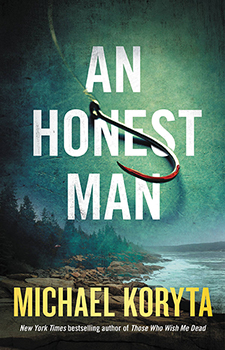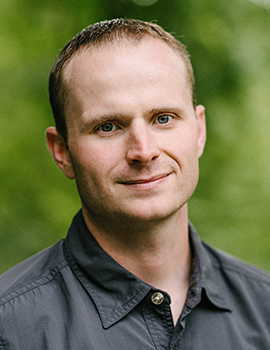

Features Michael Koryta
Hard Fought Redemption
Michael Koryta, author of the spellbinding new novel, AN HONEST MAN, is really good at answering questions, and even better at asking them. As a former private investigator and journalist—and for the last two decades, a novelist—he is driven by curiosity. “I love going into a world that I know nothing about and learning about that world from unusual and fascinating people,” he says. After writing many books, he’s learned something about himself, too: “I clearly am drawn to standalones. And standalones are always set in different worlds.”
Venturing into those worlds is what motivates him as an author. Like any good investigator, he always starts with an open mind: “What don’t I know about this story? Usually, the story is launched for me when a question that I have about a place or a profession or a hypothetical scenario begins to just sort of kick around in the subconscious. And I’ll think, wow, that could be really cool. That could be an interesting world.”
His latest novel, AN HONEST MAN, is set in a world that seems both familiar and yet exotic: a small village in Maine. With the local fishing industry in decline and the town too far north to attract tourists, Salvation Point has fallen on hard times. Many residents have moved away, and those who’ve stayed struggle to make a living. Enter Israel Pike, a man who—like his hometown—has seen better days.
Weeks after being released from prison for killing his own father, Israel discovers a yacht adrift in the waters off Salvation Point. He goes on board to check things out and makes a shocking discovery: seven men have been murdered on board, including two rival Senate candidates. From the moment he envisioned that opening, Koryta knew he had a novel. “I wrote that scene, and I sent that to my agent,” he explains, “and I said, I think we should be doing this book instead of the one that I had already been working on and already shared.”
However, Koryta admits that he had no idea where that scene—or the book itself—might take him. “All I know is what just happened,” he says. “I don’t know who these people are. I don’t know who killed them. I don’t know why. And I don’t know how we will possibly find out.” His impulse to answer those questions is what drives him. “So the way I write and the reason I have so much fun writing is because I’m the first reader, I’m writing to find out what happened.”
Ultimately, Israel finds himself under more and more pressure, to tell the truth about the murders on that yacht and to prove he’s not the killer. Meanwhile, on another part of the island, twelve-year-old Lyman Rankin escapes from his abusive father by hiding out in an abandoned house. One day, however, he finds a mysterious woman with a hatchet hiding there. Although she threatens to kill him at first, Lyman and “Hatchet” soon form a tight bond.
“Lyman is maybe my favorite character I’ve ever written,” Koryta says. “He’s up there at the top because he is handed this terrible scenario in life, but he still holds all of this hopefulness and idealism, and he has faith that you are not defined by the circumstances you’re given. He believes that he can push against that.”
Koryta drew on his days as a private investigator, working custody cases, to develop a character who is young but not naïve. “One of the things that stood out to me from those experiences is the idea that kids understand their reality in a pretty sophisticated way,” he says. “So I’m always driven nuts by books that don’t give them that level of emotional and intellectual sophistication.”
Koryta looked beyond the borders of traditional crime fiction to help portray Lyman. “I drew a lot of my inspiration or reassurance for Lyman’s point of view from writers like Angie Thomas, Gary Paulsen, and Jerry Spinelli,” he says, “the writers who have written great stories that have meant a lot to a lot of children by telling it the way it really was.” He also turned to another master of telling stories about young people: Stephen King.
Usually, the story is launched for me when a question that I have about a place or a profession or a hypothetical scenario begins to just sort of kick around in the subconscious.“When I think about King’s work, one of the magical things is that he always got kids right,” Koryta says. “He understood they saw the world differently than adults, and part of that genius is that he didn’t dumb kids down. Not at all.”
In many ways, Lyman and Israel are mirror images of each other, fighters trying to do the right thing in a world where that seems impossible. It’s a dynamic with echoes of classic 70’s paranoia thrillers, an influence on Koryta while writing this novel. Then again, maybe that was a natural outgrowth of the period during which he conceived it.
“I wrote this book as the world was locked down in a pandemic,” he says. “We were in a political situation that was unprecedented in my lifetime. And forces of darkness were all around. I don’t think it’s an accident that I wrote about an island surrounded by encroaching dark forces and then gave characters the opportunity to push back.”
Along the way, Koryta did plenty of research about life in a hard-scrabble fishing village like Salvation Point. “I’m very much a boots on the ground guy,” he explains. “So, going out to those islands and getting a feel of how they feel off-season and a little bit away from tourism, what that vibe is, those experiences definitely shape the book because you have an industry that people are rightfully proud of, and they’re fighting for its survival.”
At the same time, as Koryta set out to capture small-town Maine, he wanted the book to feel universal. “I wanted it to feel like a book that was clearly set in Maine but had thematic tissue that felt like every other part of the country right now,” he says. “If I succeeded with Salvation Point, I think you could rename it Whatever-town, West Virginia or Montana. Or pick your part of the country where your community was built on an industry that is either already gone or it is going. And what does that leave behind and how do people define their community and what are the risks?”
Even as Koryta welcomes his new novel into the world, he’s looking forward to the release of his next, set to appear under his Scott Carson pseudonym. “It’s a ghost story, but it’s also a coming-of-age novel,” he says. “And it’s set in my hometown in 1999. I have never had more fun writing than I did on this book. AN HONEST MAN is set in a very dark world. The new book is a horror novel, but I’d be stunned if people didn’t laugh out loud while reading it.”
- LAST GIRL MISSING with K.L. Murphy - July 25, 2024
- CHILD OF DUST with Yigal Zur - July 25, 2024
- THE RAVENWOOD CONSPIRACY with Michael Siverling - July 19, 2024


